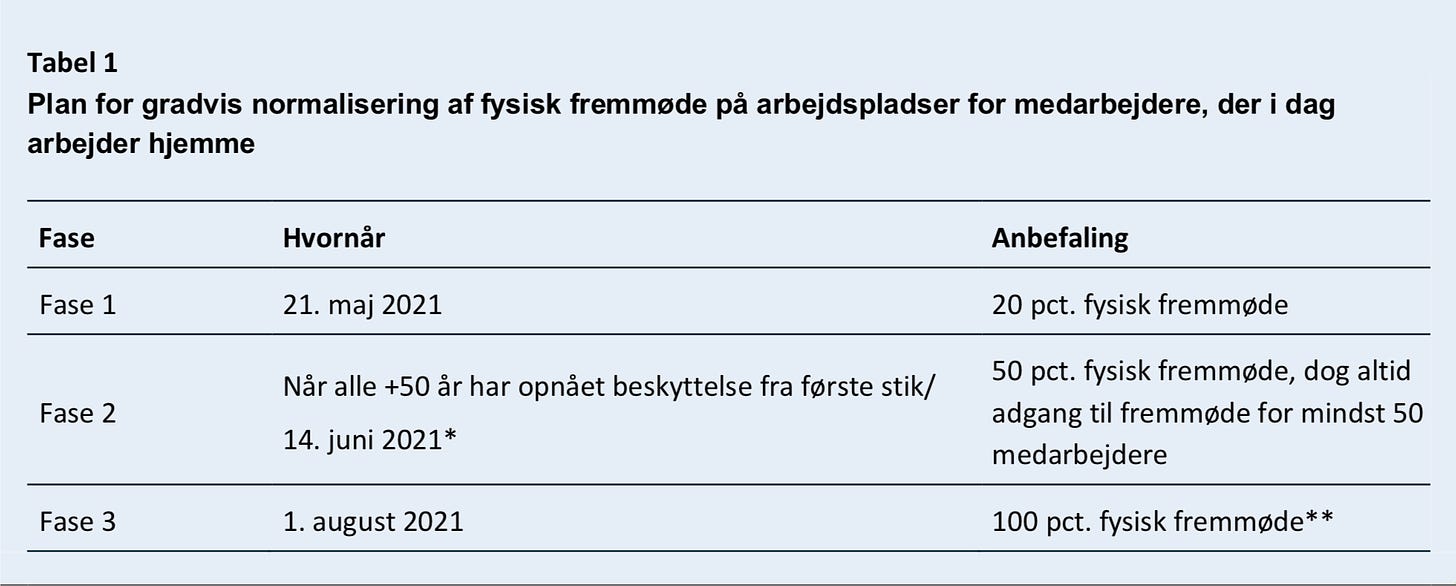Denmark to return to almost ‘normal’
Politicians have reached an agreement on a much broader next phase of reopening
🇩🇰
The Danish government and a majority of the political parties have reached another agreement on a much broader reopening set for May 21st. Essentially anything that hasn’t been reopened yet will do so next week with one exception, nightlife venues like dance clubs and discos, which will remain closed.
There are two major adjustments in this latest agreement. One is a beginning of a three phase plan to get everyone working from home back into their office or workplace. In phase one, beginning May 21st, 20% of staff can physically return to work. In phase two, workplaces with 50 or fewer employees can return to full capacity while those with a workforce over 50 are capped at 50% of staff physically being in the office. The last phase on August 1st sees all offices and workplaces return to normal.
The other major change is that freedoms enjoyed by fully vaccinated people will be extended to those with just one vaccination dose. The change will be made in the coronapas so that people with one dose no longer have to undergo frequent testing to access events, restaurants, and amusement parks. Two important things to mention are one: this only counts 14 days after your first inoculation and two: the first shot ‘vaccination’ status will have a time limit to ensure people get a second dose.
Health authorities are emphasizing increases in infection activity in Denmark are a reflection on the easing of restrictions on April 21st while the impacts of the last reopening on May 6th have yet to be felt.
May 21st
(with a vaccine passport)
The assembly ban is raised to 50 for indoor events and 100 for outdoor.
Phase one of the gradual return to work begins.
Day colleges, folk high schools, and evening schools (Folkeuniversiteter) can reopen.
All remaining students in youth and adult education who haven’t already can return to class at 100% capacity. Classroom capacity for students in higher education also return to full capacity.
Music, culture schools, and art programs can reopen to people over 18 years of age. All singing activities can also resume.
All remaining sports, leisure, and association activities not already opened in previous phases can now resume. This includes any facilities with sports or leisure activities including saunas or steam baths.
All indoor areas can reopen in amusement parks, zoos, aquariums, arcades, casinos, and water parks. (with a vaccine passport)
Outdoor events with standing audiences can raise the number of people per section to 500 and the area requirement per person is relaxed to two meters squared.
Coronapas restrictions are eased slightly for libraries and voluntary associations. Instead of checking each coronapas on entry they can now do one random coronapas check per day of everyone in the facility.
The automatic lockdown requirement for municipalities and districts exceeding certain infection benchmarks has been extended to include major gatherings, trade fairs, and markets.
June 11th
The assembly ban is raised to 100 for indoor events.
The outdoor assembly ban is abolished.
August 1st
The assembly ban is abolished entirely.
In June, politicians will begin to work on plans to phase out the vaccine passport and mask use. They will also determine when nightlife venues, which have been closed since the first wave, can reopen. Restrictions on large events, gatherings, and on taking public transit will also be reassessed.
The agreement states politicians will table a plan next month to assess the coronapas requirement in each sector to determine if the requirement can be eased or lifted. The decision will be based on infection risks, ability of a venue to administer testing as needed, practical, and logistical considerations. An end date or ‘sunset clause’ will also be determined to largely lift the vaccine passport requirement almost entirely with the only exception being for tourism and travel. As an aside, the actual dedicated coronapas app isn’t supposed to debut until the end of June after they start phasing out its use.
It won’t be until most of the population over the age of 16 years old has been vaccinated that mask mandates and the vaccine passport will be almost entirely abolished.
Minister of Justice Nick Hækkerup:
“Even though the infection has increased recently, we are still in a sensible place in Denmark, where there is still an opportunity to reopen society. I am pleased that a broad majority in the Folketing is once again behind a joint and balanced agreement, which includes a plan for when the many employees who have worked from home for a long time can return to workplaces and colleagues. At the same time, I am very pleased that the parties agree that the reopening of society must continue to be gradual and responsible, not least because we have not yet seen the possible contagious consequences of the recent reopening. "
Minister of Health Magnus Heunicke:
“Denmark is in a good place with the right tools to continue to maintain epidemic control. We have a massive testing capacity to monitor the infection and take effective action in the event of local outbreaks, so that infection chains are broken quickly. Through the epidemic, the Danes have been eminent for complying with guidelines, being tested, and largely supporting the vaccination program. These are very important reasons why more people can now meet physically again in the workplace, and we are reopening more with the corona passport as a continuing part of the gradual and responsible reopening. ”
You can read the full agreement in Danish HERE.




